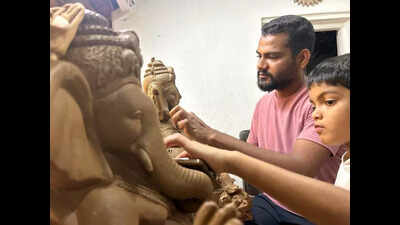ARTICLE AD BOX

Panaji: As Ganesh Chaturthi nears and concerns rise over market penetration of Plaster of Paris (PoP) idols, the Goa Handicrafts Rural and Small Scale Industries Development Corporation (GHRSSIDC) has begun surveying markets to prevent the sale of PoP idols.
Over the last four years, the number of registered traditional idol makers rose from 367 to 475, said GHRSSIDC managing director Damodar Morajkar.Despite the corporation’s subsidy scheme, traditional idol makers struggle with rising costs, insufficient aid, and labour shortages.Morajkar said the survey to identify PoP idol sales began on Aug 8, and so far, GHRSSIDC’s inspection has flagged none. He said that the inspection will continue until Aug 24.“Local mud clay idols are the customer’s first choice, due to our awareness campaigns. The Shadu Mati and coconut fibre idols from Maharashtra are also in demand, but not as much as the local clay ones,” Morajkar told TOI.GHRSSIDC offers a subsidy of Rs 250 per idol for up to 250 idols to the local idol makers. As of July 2025, GHRSSIDC received 367 local vendor applications for registration. In 2024, 475 vendors received subsidies totalling Rs 90.5 lakh on the sale of 45,248 idols, Morajkar said.
Pernem, Sattari, and Bicholim talukas have the highest concentration of traditional Ganesh idol makers in Goa.“Earlier, we used to get the Chikal Mati at Rs 20,000 for a 10m truck. Now, the prices have risen to Rs 25,000,” said Bicholim sculptor Durgaram Shet. Shet said long travel for vendors to get mud is making sourcing difficult for some sculptors.Local artisans allege the PoP idol ban is not strictly enforced. The clay idols are heavier, with rich colours being another distinguishing feature.Umakant Poke, a third-generation sculptor from Morjim, Pernem, said that because certain vendors sell PoP idols, local sculptors catch negative attention from handicraft officials. “They think we are selling PoP idols. We are hard-working people, and trying to earn money with our honest efforts,” Poke said.



.png)
.png)
.png)
















 7 hours ago
5
7 hours ago
5









 English (US) ·
English (US) ·